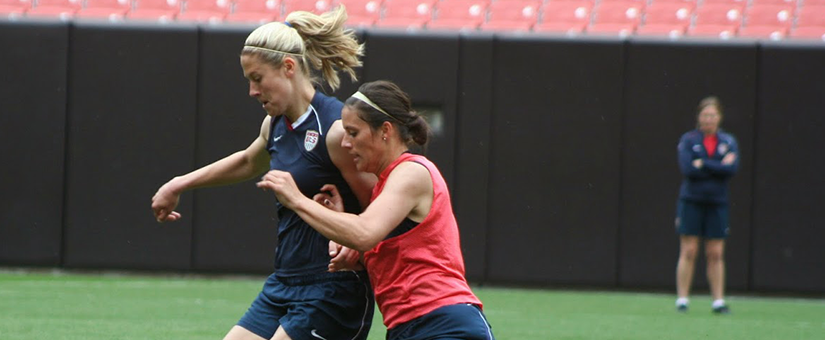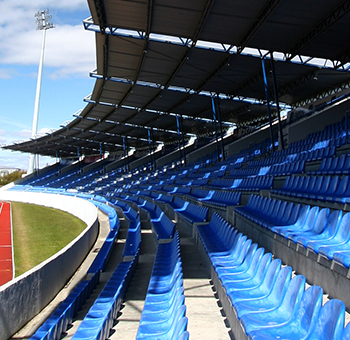
Making Pressure Work For You on the Field
The term “pressure” frequently dominates the headlines of sporting events everywhere we look. We see it all over social media, people frequently talk about how they have pressure-packed moments, or are in pressure-filled events. At times it would seem teams and athletes wear the term pressure like a badge of courage or ready-made excuses. The great news is that when athletes feel pressure, we know that they are totally engaged in their sport and that it matters. The not so great news is that when athletes feel pressure they have given up control. Ask any athlete if they are going to succeed in their sport after they have given up control and the answer will be a dumbfounded ‘no, of course not.’ So let’s talk about how to get things back under control and kick pressure to the curb. Show it who’s boss.
“Pressure is the athlete’s perception surrounding the competition-not the actual event itself”

There are a variety of elements that go into an athlete feeling pressure. However, the most common reasons surround an athlete’s personal expectations of performance or when an athlete chooses to focus to a great extent on the outcome of a competition. Athlete everywhere compete for the love of the game, success on the field, and with the hope of experiencing positive outcomes. How we define success tends to be the key to making pressure work for you rather than work against you.
Athletes of all ages and abilities commonly report feeling so much pressure during some big events that they find it difficult to perform when it matters most. This is referred to as choking, tightening up, or bailing out on the team.
If pressure has such a negative impact on performance, can’t we just ignore it? Ignoring its presence will only make it all that much harder to handle. Left unchecked pressure can grow into a nightmare. So what exactly is pressure in an athletic sense and why does it affect athletes? How is it created? When will it affect athletes? What can players do to perform under pressure?
By understanding and identifying the process of pressure and its potential effects on one’s game, players can become better prepared and equipped to perform in critical competitive moments. Effective athletes have learned how to make pressure work for them by understanding how pressure occurs.
What is pressure really?
Pressure usually refers to the feelings an athlete has about how he or she will perform in a certain situation.
Pressure manifests itself in three ways:
- Physically: it can affect athletes through increased adrenaline levels, increased breathing rate, excessively elevated heart rate, frequent needs to urinate, upset stomach, etc.
- Mentally: pressure affects athletes through positive or negative thoughts about the outcome of the event.
- Emotionally: pressure gets to athletes via positive feelings of anticipation and excitement, or the negative feelings of fear, anxiety, worry.
Remember, pressure is the athlete’s perception surrounding the competition–not the actual event itself. As an example, when we wake up from nightmares, we know that it was just a collection of images that were unsettling while we slept. Once awake, we can rationalize that dreams and nightmares aren’t real even though they felt like they were very real while we were sleeping. Our bodies respond in a very real way to these dreams when we’re not in control. Maybe we got sweaty, our heart raced, we felt unsettled. But we know logically that dreams aren’t real even though we generated a physiological response to the dream. So when we are awake we are able to logically take emotion out of it and recognize that we were just dreaming. Pressure in an athletic event has similar effects on body. Pressure is an athlete letting their feeling about the event control their perspective.
How is pressure created?
It is critical to understand that sporting events and competitions contain no pressure in and of themselves. There is zero pressure in a competition. The competition is just a collection of people getting together over a game or event. As athletes, we choose to assign meaning to these games since they are important to us.
Pressure is the internal experience (feeling) that is created by an athlete’s expectations of the competition. Pressure is created by how athletes perceive a particular game. Or what they want the outcome to be. Alternatively, in bigger pictures, how an athlete sees their role/expectations on a team, the expectations they have for the season as whole, or even where in the standings they hope their team will finish.

How an athlete views their role, a game, or end of season finish will determine their internal response in a competitive situation. Do they see the situation as a challenge or threat? If it’s seen as a challenge then it’s probable that they will be able to apply their energy to perform, learn, and grow in the situation. When athletes see competition as a threat then our fight or flight reactions tend to take over and our body responds by increasing adrenalin, narrowing our vision, and taking over our fine motor control. Ultimately your perception of a game or meet as a threat could determine how you perform if you let pressure take control.
“Successful athletes see events and competitions as challenges, rather than as threats”
Pressure is a word that is frequently misused in our vocabulary. We give it life. We make it a real live being that can take control whenever it wants. When you start thinking of pressure as having control, it’s because you’ve started to think too much about the outcome and possible failure associated with that outcome.
When an athlete focuses on the outcome, fears what might happen, or worries about meeting other people’s expectations then they open the door to let pressure in. This translates into a tentative and questioning performance making it hard to take risks or even perform fluidly like a player is capable.
What can players do to better perform when feeling pressure?
First, remember that that you create “pressure” for yourself by focusing on outcome. If you created pressure by only considering the outcome of a contest, then you can also break it apart and render it useless by focusing on the correct variables you can control.
Stay focused on the process. Frequently ask yourself What’s Important Now?” as you play.
- Is it to win the game, or receive each ball softly?
- Is it to win the game, or explode away from your mark?
- Is it to win the game, or provide cover when your teammate steps to defend?
- Is it to win the game, or to strongly catch that cross?

To dismantle pressure athletes would do well to focus on exactly what they need to do in that moment rather than the outcome. When a player focuses on each moment as it comes then they are able to work with the technical and tactical aspects of the game they can control. Own each of those moments. Asking yourself,“What’s Important Now?” helps direct one’s thoughts to the current task, which is made up of variables an athlete can control.
“Pressure can intrude when a player worries about not meeting others’ expectations”
Secondly, it will be helpful to understand that the expectations an athlete has to perform well, get results, or live up to others perceptions come from inside themselves. What happens when a player is afraid of not performing up to their own expectations? They tend to tighten up and play safe. This approach will always rob a player of his or her fullest capabilities.
Pressure can intrude when a player worries about not meeting others’ expectations.
Remind yourself why you started playing soccer in the first place. It was for you because you like it a lot! Soccer hasn’t changed at all since your early years of competing. Find success in the little things you do on and off the ball that demonstrate the solutions you have to the challenges the game kicks your way. Remember why the game brings you joy.
Try these ideas to break apart pressure:
Tip 1: Put the right perspective on the game by asking yourself the following question: Is it your expectation that you somehow have to be better today than you are every other day on the field? Are these expectations valid? Or is your everyday self exactly what the game needs?
Tip 2: Identify your job and role on the field. Any time you notice your focus drifting towards outcome, ask yourself,“What’s Important Now?” in order to refocus on the technical or tactical task at that moment. Remember how much better your team is when you correctly perform your role, play after play.
Tip 3: Remind yourself that you have gotten to this point through countless hours or practice and repetition. Trust those well-developed skills. Take a few minutes every day do go through imagery sequences where you are effectively performing your role. See yourself working hard, being effective, and smiling. You love this game!
- Getting Your Intensity Level Right - March 17, 2025
- Building a Functional Resilience Plan is Vital to a Referee’s Success - February 18, 2025
- sport in a pandemic: Crisis or opportunity?Chapter 4 - December 4, 2020


